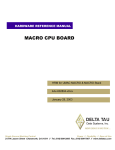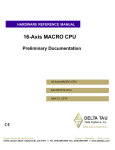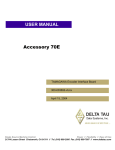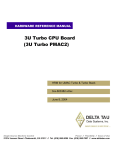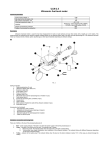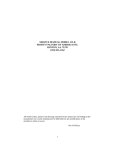Download Delta Tau MACRO CPU BOARD 4Ax-602804-xHxx Specifications
Transcript
^1 HARDWARE REFERENCE MANUAL ^2 MACRO CPU Board ^3 HRM for UMAC MACRO & MACRO Stack ^4 4Ax-602804-xHxx ^5 June 7, 2004 Single Source Machine Control Power // Flexibility // Ease of Use 21314 Lassen Street Chatsworth, CA 91311 // Tel. (818) 998-2095 Fax. (818) 998-7807 // www.deltatau.com Copyright Information © 2003 Delta Tau Data Systems, Inc. All rights reserved. This document is furnished for the customers of Delta Tau Data Systems, Inc. Other uses are unauthorized without written permission of Delta Tau Data Systems, Inc. Information contained in this manual may be updated from time-to-time due to product improvements, etc., and may not conform in every respect to former issues. To report errors or inconsistencies, call or email: Delta Tau Data Systems, Inc. Technical Support Phone: (818) 717-5656 Fax: (818) 998-7807 Email: [email protected] Website: http://www.deltatau.com Operating Conditions All Delta Tau Data Systems, Inc. motion controller products, accessories, and amplifiers contain static sensitive components that can be damaged by incorrect handling. When installing or handling Delta Tau Data Systems, Inc. products, avoid contact with highly insulated materials. Only qualified personnel should be allowed to handle this equipment. In the case of industrial applications, we expect our products to be protected from hazardous or conductive materials and/or environments that could cause harm to the controller by damaging components or causing electrical shorts. When our products are used in an industrial environment, install them into an industrial electrical cabinet or industrial PC to protect them from excessive or corrosive moisture, abnormal ambient temperatures, and conductive materials. If Delta Tau Data Systems, Inc. products are directly exposed to hazardous or conductive materials and/or environments, we cannot guarantee their operation. MACRO CPU Board Hardware Reference Manual Table of Contents INTRODUCTION .......................................................................................................................................................1 3U Product Configurations (General Description) ....................................................................................................2 MACRO CPU Specifications....................................................................................................................................3 Physical Specifications .........................................................................................................................................3 Electrical Specifications .......................................................................................................................................3 CONFIGURATION AND HARDWARE SETUP ....................................................................................................5 Board Hardware Setup ..............................................................................................................................................5 Board Jumper and Switch Setup................................................................................................................................6 Board Connections ....................................................................................................................................................7 JUMPER AND SWITCH CONFIGURATIONS......................................................................................................9 Card Layout...............................................................................................................................................................9 E1: Watchdog Timer Disable ............................................................................................................................10 E2: CPU Mode Operation .................................................................................................................................10 E3: Serial Port Baud Rate .................................................................................................................................10 E4: Power Supply-Loss Control (±15Vdc Supply Monitor)...............................................................................10 E5: MACRO Received Signal Detect/Bypass Mode (Rev -105 and 106 only) ...................................................10 E40: MACRO Input (Fiber/Wired) Selector ......................................................................................................11 JP3: MACRO Loop Back Test Select for Copper only (Rev -104 and Earlier) .................................................11 JP4: Reserved for Future Use ............................................................................................................................11 JP5-JP6: MACRO Copper EQ Select (Rev -104 and Earlier)............................................................................11 Switch Configurations.............................................................................................................................................12 SW1: MACRO Slave Node Configure................................................................................................................12 SW2: MACRO Master Number Select ...............................................................................................................13 Connector Summary................................................................................................................................................13 MACRO STATION CHARACTER DISPLAY......................................................................................................15 Hardware Re-Initialization ......................................................................................................................................15 FIRMWARE UPDATES ..........................................................................................................................................17 BOARD CONNECTOR PINOUTS .........................................................................................................................19 J6: (JTHW) Multiplexer Port Connector .................................................................................................................19 J7: (JRS232) Serial Port Connector.........................................................................................................................20 J14, J17: MACRO Copper I/O (Opt C)..................................................................................................................21 P1: UBUS Interface Connector ...............................................................................................................................22 TB1: (JPWR) 4-Pin Terminal Block .......................................................................................................................22 U73: MACRO Fiber Optic Connector (Option A) ..................................................................................................23 HARDWARE MEMORY MAP ...............................................................................................................................25 ACCESSORIES .........................................................................................................................................................27 Table of Contents i MACRO CPU Board Hardware Reference Manual ii Table of Contents MACRO CPU Board Hardware Reference Manual INTRODUCTION The 3U MACRO-CPU board is the processor and MACRO interface board that is used in a 3U MACRO Station (in either UMAC MACRO or MACRO Stack configuration). Note: Three documents describe the operation of Delta Tau Data Systems Inc. 3U MACRO Station products: • UMAC System Manual (General Product Overview) • 3U MACRO Station User’s Manual • 3U MACRO Station Software Reference This manual describes the interfaces and physical hardware that is used on the 3U MACRO CPU. The UMAC MACRO and the MACRO Stack provide a remote interface for encoders, flags, direct-PWM digital drives, analog drives, stepper drives, analog I/O, and digital I/O for Delta Tau Data's PMAC products that have a MACRO interface. The UMAC MACRO and MACRO Stack configurations communicate with PMAC2 Ultralites or Turbo PMAC2 Ultralites solely through the MACRO ring, interfacing to standard drives, encoders, flags, and I/O through on-board connectors. This MACRO Station integrated packaging and connectivity strategy provides revolutionary flexibility and ease of use. A 3U MACRO Station consists of a set of 3U format Euro-cards (100 x 160 mm) that can be assembled in a variety of configurations. When used in the rack configuration, connected through a backplane bus, the backplane is UBUS format, designed by Delta Tau Data Systems Inc. for motion control and I/O interfaces. When using the fiber optic MACRO interface, the 3U MACRO Station can be up to 3 kilometers (2 miles) away from the PMAC2 controller or any other station on the ring. When using the RJ-45 copper electrical interface, it can be up to 100 meters (~330 feet) away. The 3U MACRO Station allows PMAC2 MACRO controllers to control servo axes and I/O just as if they were directly connected to the PMAC2, even though they may be a great distance away. The only interface needed from the PMAC2 is the electrically isolated MACRO ring. Typically, a PMAC2 Ultralite board, one without any of its own servo interface circuitry, is used with the MACRO Station to provide the most cost-effective solution. • 3U MACRO-CPU Board (3A0-602804-10x): • 80MHz DSP56303 CPU • 512k x 8 flash memory for user backup and firmware • Latest released firmware version • RS-232 serial interface for setup and debugging • Stack connectors for servo and I/O accessory boards • UBUS connector for backplane connection to servo and I/O accessory boards • JTHW multiplexed I/O port with 26-pin IDC header Introduction 1 MACRO CPU Board Hardware Reference Manual The 3U MACRO Station can be configured in either of two fundamental assemblies – UMAC MACRO and MACRO Stack: • UMAC MACRO – In this configuration (once called Pack) the 3U-format boards are put together to communicate through a backplane bus called the UBUS. All boards are installed in a Euro-card rack. In this configuration, all 3U-format boards or modules can be installed or withdrawn from the pack individually, providing ease of installation, debugging, and repair. The photo at the upper right shows a UMAC rack with power supply and I/O boards that are connected through a backplane. This system allows for an easier integration of the 3U MACROCPU for larger (up to 8 axes) applications. • MACRO Stack – In the Stack configuration the 3U-format boards are put together as a stack of piggyback boards, (right, below). This configuration is ideal for compact, cost-sensitive embedded applications. Note: The Stack boards and related breakout boards can be installed in a Euro-card rack, creating a hybrid “stack/pack” configuration. This requires a special backplane configuration that makes removing stack boards difficult. This hybrid configuration is now recommended for existing legacy systems only. 3U Product Configurations (General Description) Assemblies of 3U-format boards can be made with either of two CPU processor boards – a 3U MACRO CPU board, or a 3U Turbo PMAC2 CPU board. Most other 3U-format boards, labeled Accessory boards, can be used with either CPU board. • When the 3U MACRO-CPU board is used, the resulting assemblies are called UMAC MACRO or 3U MACRO Stack. • When the 3U Turbo PMAC2 CPU board is used, the resulting assemblies are called UMAC Turbo or Turbo Stack. Refer to the UMAC and 3U Stack Products Selection Guide for more detailed descriptions of how the rack and stack products are integrated. 2 Introduction MACRO CPU Board Hardware Reference Manual MACRO CPU Specifications Physical Specifications Size: Weight: 16cm x 10cm x 3.6cm (6.3" x 3.95" x 1.4") ½ lb. Temperature Operating: Storage: 0°C to 60°C (32°F to 140°F) 12°C to 82°C (10°F to 180°F) Humidity: 10% to 95%, non condensing Electrical Specifications Power: Introduction 1.5A @ +5V (±5%) (7.5W) Pertains to 8-channel configuration with a typical load of encoders. 3 MACRO CPU Board Hardware Reference Manual 4 Introduction MACRO CPU Board Hardware Reference Manual CONFIGURATION AND HARDWARE SETUP The purchase of the 3U MACRO CPU board provides a 3U-format (100mm x 160mm) board with a DSP processor, MACRO ring circuitry, piggyback connectors onto which stack accessory boards can be mounted, and a backplane connector through which other 3U-format boards can be connected by means of a UBUS passive-backplane board. The MACRO CPU board went through an extensive redesign in the –105 revision, because key components on the –104 and older revisions became obsolete. Both the older and the newer versions are described in this manual. The only system change required is a slight change in the DIP-switch addressing of Acc-24E2x and Acc-51E backplane axis boards when using the new MACRO CPU boards. Note: It is recommended that only the new MACRO CPU boards, which have stronger backplane bus drivers, be used in UMAC pack configurations. The 3U MACRO-CPU can be purchased in two physical configurations, distinguished by part number prefix: • 300-602804-10x provides the 3U MACRO-CPU board without a front plate. This configuration is recommended for stack assemblies. • 3R0-602804-10x provides the 3U MACRO-CPU board with a front plate. This configuration is recommended for UMAC rack assemblies. The top and bottom plates are provided with the Acc-Px rack. There are a few options available for the MACRO CPU board. One of the Options A or C must be present on a MACRO CPU board to provide the actual MACRO ring interface circuitry; both may be present: Option A provides an SC-style fiber-optic transceiver to connect into the MACRO ring. Its main component is the U73 transceiver. Option C provides RJ-45 electrical input and output connectors for the MACRO ring. Its main components are J14 and J17. Option 10 permits a specified revision of the MACRO Station firmware to be installed in the flash memory in the card. Without this option, the latest released revision is installed. A label on the flash memory IC indicates the firmware revision installed at the factory (but not necessarily which revision is presently installed in the IC). The presently installed revision can be ascertained by using the MSVER{node #} command. Board Hardware Setup The hardware setup of the 3U MACRO CPU Board consists of the setting of two rotary switches, the setting of several E-point jumpers on each board, followed by power supply and signal connections. Note: E-Point Jumper numbers are shown in white ink on the legend of each board. Pin numbers for each number can be determined either from the legend on the component side on the board, or by looking at the solder side of the board, where pin 1 has a square solder pad. Configuration and Hardware Setup 5 MACRO CPU Board Hardware Reference Manual Board Jumper and Switch Setup The MACRO Station has two 16-way rotary switches on the MACRO CPU board that establish the station’s basic configuration on the MACRO ring. SW1 Rotary Switch Setting: SW1 establishes how many servo nodes, and which servo nodes, will be used on the MACRO station. It also establishes the mapping of MACRO node numbers to MACRO Station channel numbers. This mapping information will be important in establishing the software setup. The following table shows possible MACRO Station axis configurations and the appropriate settings of SW1: # of Servo Channels and Nodes Used Which MACRO Servo Nodes Used Stack Axis Boards Used 2 2 2 2 2 2 2 2 4 0, 1 4, 5 8, 9 12, 13 0, 1 4, 5 8, 9 12, 13 0, 1, 4, 5 1x Acc-1E 1x Acc-1E 1x Acc-1E 1x Acc-1E 1x Acc-2E* 1x Acc-2E* 1x Acc-2E* 1x Acc-2E* 1x Acc-2E Backplane (UMAC) Axis Boards Used SW1 Setting -8 -9 -10 ($A) -11 ($B) 1x Acc-24E2x or 51E 2 1x Acc-24E2x or 51E 3 1x Acc-24E2x or 51E 4 1x Acc-24E2x or 51E 5 1x Acc-24E2x with Option 1x or 1x 0 Acc-51E with Option 1 4 8, 9, 12, 13 1x Acc-2E 1x Acc-24E2x with Option 1x or 1x 1 Acc-51E with Option 1 6 0, 1, 4, 5, 8, 9 1x Acc-1E, 1x Acc-24E2x with Option 1x or 1x 12 ($C) 1x Acc-2E Acc-51E with Option 1; Plus 1x Acc-24E2x or 51E 6 0, 1, 4, 5, 8, 9 2x Acc-2E* 1x Acc-24E2x with Option 1x or 1x 6 Acc-51E with Option 1; Plus 1x Acc-24E2x or 51E 8 0, 1, 4, 5, 8, 9, 12, 13 2x Acc-2E 2x Acc-24E2x with Option 1x / 7 Acc-51E with Option 1 More detailed information on the SW1 settings is presented in the Jumper/Switch description in the back of this manual. SW2 Rotary Switch Setting: SW2 establishes the number of the master IC to which the MACRO station will respond. The values of 0 to 15 correspond to Master numbers 0 to 15, respectively. For a non-Turbo PMAC2 master, this value must match the master number value in the first hexadecimal digit of PMAC2’s I996. For a Turbo PMAC2, this value must match the master number value in the first hexadecimal digit of the Turbo PMAC2’s I6840, I6890, I6940, or I6990, for MACRO ICs 0, 1, 2, or 3, respectively, on the Turbo PMAC2. The default switch setting is 0, so the station will respond to Master 0. Watchdog Timer Enable Jumper: For normal operation of the Compact MACRO Station, jumper E1 should be OFF to enable the watchdog timer (an important safety feature). Operational Mode Jumper: Jumper E2 should connect pins 2 and 3 to tell the CPU it is in normal operational mode, not in bootstrap mode. It should only connect pins 1 and 2 to load new firmware into the flash IC through the serial port. Baud Rate Jumper: Jumper E3 must be ON if you are connecting an Acc-8D Option 9 Yaskawa absolute encoder converter to the J7 serial port (most users will connect it to the JTHW port instead). This sets the baud rate to 9600. If E3 is OFF, the baud rate is 38400. 6 Configuration and Hardware Setup MACRO CPU Board Hardware Reference Manual Power Supply Check Jumper: Remove jumper E4 if you are not bringing a +/-12V to +/-15V supply into the Compact MACRO Station itself (5V only). If bringing these analog circuit supplies into the Compact MACRO Station, it is best to have jumper E4 on, so that the servo outputs are disabled if either of the analog supplies is lost. MACRO Input Select Jumper: Because the MACRO CPU board can potentially accept MACRO ring input from either the RJ-45 electrical input or the fiber input, select which input is used (even if only one of the ring interface options is present). Jumper E40 must be ON to use the fiber input; it must be OFF to use the electrical input. (If both interface options A and C are present, either ring output may be used, regardless of the setting of E40.) MACRO Signal-Loss Detect Jumper: Jumper E5 (board revisions –105 and newer only) should connect pins 1 and 2 so that the MACRO receiver’s (fiber or electrical) loss-of-signal detect is reported automatically as a byte violation error. Older revisions (-104 and before) of the board could not use the receiver’s signal-loss detect as a violation error (relying on higher-level detection schemes), and connecting pins 2 and 3 makes operation of the new revision completely compatible with the old. This is not recommended. Board Connections The connection of Compact MACRO Station to other stations on the MACRO ring is achieved by connecting the output connector of the Compact MACRO Station to the input connector of the next station and by connecting the output connector of the previous station to the input connector of the Compact MACRO Station. There must be a completely connected ring, with all stations powered up, for any communications to occur on the ring. Optical Fiber Ring Connection: The U73 integrated fiber optic transceiver is used for both the optical fiber input and the optical fiber output connections to the MACRO ring. With the component side of the board up, and the opening facing you, the input socket is on the right, and the output socket is on the left (these are marked on the component). RJ45 Electrical Ring Connection: The J14 connector is used for the input from the previous station on the MACRO ring if electrical connection is used, and the J17 connector is used for the output to the next station on the MACRO ring. Multiplexer Port: The J6 26-pin header is used to connect to multiplexer port accessories such as the Acc-8D Option 7 resolver-to-digital converter board and the Acc-8D Option 9 Yaskawa absolute encoder interface board. This port can be used alternately to provide eight inputs and eight outputs (nonmultiplexed) at TTL levels. Backplane UBUS Expansion Port: The P2 96-pin DIN header is used to connect to expansion port accessories such as the Acc-9E, 10E, 11E, 12E, and 14E I/O boards, or the Acc-24E2x axis boards, through an Acc-Ux UBUS backplane board. It can also be used to bring in 5V power, and optionally +/15V power, from a backplane or breakout board, to the entire MACRO Station. Note: When interfacing to accessory boards across the UBUS backplane, it is strongly recommended to use a new revision (-105 or higher) of the MACRO CPU board, and an Acc-Ux backplane board (not an older Acc-Jx backplane board). The newer revision MACRO CPU boards have stronger bus driver ICs, but they do not work well with the termination of the Acc-Jx backplane boards. Power Terminal Block: The TB1 4-point terminal block can be used to bring in 5V power, and optionally +/-15V power, to the entire MACRO Station. In a UMAC (pack) configuration, the power is more likely to be brought in through the backplane. Configuration and Hardware Setup 7 MACRO CPU Board Hardware Reference Manual 8 Configuration and Hardware Setup MACRO CPU Board Hardware Reference Manual JUMPER AND SWITCH CONFIGURATIONS Card Layout The Location columns of the following tables refer to the mapped locations shown in the drawings below: Note: Pin 1 of an E-point is masked by an X in white ink on the composite side and by a square solder pad on the solder side. Jumper and Switch Configurations 9 MACRO CPU Board Hardware Reference Manual E1: Watchdog Timer Disable Rev –105 and Rev –104 and Later Location Earlier Location B-1 F-1 Jumper Type Description Default 2-Pin Remove jumper to enable Watchdog Timer. Jump pins 1 and 2 to disable Watchdog Timer (for test purposes only). Not jumpered E2: CPU Mode Operation Rev –105 and Rev –104 and Later Location Earlier Location D-2 D-1 Jumper Type 3-Pin Description Jump pins 1 and 2 for firmware download through serial port. Jump pins 2 and 3 for normal operation. Default Pin 2-3 E3: Serial Port Baud Rate Rev –105 and Rev –104 and Jumper Later Location Earlier Location Type E-3 E-2 2-Pin Description Jump pins 1 and 2 for 9600-baud serial port operation. (Required for Yaskawa interface). Remove jumper for 38400-baud serial port operation. Default Not jumpered E4: Power Supply-Loss Control (±15Vdc Supply Monitor) Rev –105 and Rev –104 and Jumper Later Location Earlier Location Type E-3 E-2 2-Pin Description Default Jump pins 1 and 2 to disable servo outputs on Not jumpered loss of +5V, +15V, or –15V power supply. Remove this jumper to monitor +5Vdc power supply only. ±15V supply monitoring is not usually required for applications without DACs or A-D converters. E5: MACRO Received Signal Detect/Bypass Mode (Rev -105 and 106 only) Does not Exist on Rev 107 and Later Models Rev –105 and Rev –104 and Jumper Later Location Earlier Location Type B-3 10 3-Pin Description Jump pins 1 and 2 to access the receiver’s signal detect operation. Jump pins 2 and 3 to bypass the receiver’s signal detect operation. This jumper does not exist on MACRO-CPU versions -104 and earlier. Default Pin 1-2 Jumper and Switch Configurations MACRO CPU Board Hardware Reference Manual E40: MACRO Input (Fiber/Wired) Selector Rev –105 and Later Location B-3 Rev –104 and Jumper Earlier Location Type C-3 2-Pin Description Remove jumper to select MACRO wired (RJ45) input from J14. Jump pins 1 and 2 to select MACRO fiber optic input from U73. Default Jumpered (Option A) Not jumpered (Option C) JP3: MACRO Loop Back Test Select for Copper only (Rev -104 and Earlier) Rev –105 and Later Location Rev –104 and Jumper Earlier Location Type B-1 2-Pin Description Remove jumper to select loop back in the copper interface of MACRO communications (for test purposes only). Jump pins 1 and 2 for normal copper MACRO communications. This jumper does not exist on MACRO-CPU versions 105 and greater. Default Pin 1-2 JP4: Reserved for Future Use JP5-JP6: MACRO Copper EQ Select (Rev -104 and Earlier) Rev –105 and Later Location Rev –104 and Jumper Earlier Location Type B-1 Jumper and Switch Configurations 2-Pin Description These jumpers are used to select different modes of equalization when copper-based communications are used. When not jumpered, adaptive equalization is used. JP5 and JP6 are used for manufacturer's testing only. These jumpers do not exist on MACRO-CPU versions - 105 and greater. Default Not jumpered 11 MACRO CPU Board Hardware Reference Manual Switch Configurations SW1: MACRO Slave Node Configure SW1 Setting # of Servo Channels MACRO Servo Station and Nodes Used Nodes Specified Channel Nos. Station Channel Starting Addresses 0 (default) 1 4 4 0, 1, 4, 5 8, 9, 12, 13 1, 2, 3, 4 1, 2, 3, 4 $C000, $C008, $C010, $C018* $C000, $C008, $C010, $C018* 2 3 4 5 6 2 2 2 2 6 0, 1 4, 5 8, 9 12, 13 0, 1, 4, 5, 8, 9 1, 2 3, 4 1, 2 3, 4 1, 2, 3, 4, 5, 6 7 8 8 9 10 11 12 2 2 2 2 6 $C000, $C008* $C010, $C018* $C000, $C008* $C010, $C018* $C000, $C008, $C010, $C018, $C020, $C028* $C000, $C008, $C010, $C018, $C020, $C028, $C030, $C038* $C090, $C098 $C090, $C098 $C090, $C098 $C090, $C098 $C000, $C008, $C010, $C018,* $C090, $C098 None 0, 1, 4, 5, 8, 9, 12, 1, 2, 3, 4, 5, 6, 7, 13 8 0, 1 9, 10 4, 5 9, 10 8, 9 9, 10 12. 13 9, 10 0, 1, 4, 5, 8, 9 1, 2, 3, 4, 9, 10 13 0 (I/O only) None None 14 (Reserved For Future Use) 15 *** 0 11 * These addresses are for stack axis boards. Add $40 to these addresses for backplane axis boards. ** Other bits of this I-variable may also be set to enable I/O nodes or other slave stations it is commanding *** A setting of 15 forces the station to use its factory default I-variables on power-up/reset. SW1 Setting First Axis Board Servo IC Second Axis Board Servo IC PMAC2’s I996 Value ** (Turbo PMAC2’S I6840, etc. PMAC2’s I1000, I1002 Value (Turbo PMAC2’s I70, I71, etc.) 0 (default) 4-axis None $F8033 $0033 1 4-axis None $FB300 $3300 2 4-axis None $F8003 $0003 3 4-axis None $F8030 $0030 4 4-axis None $F8300 $0300 5 4-axis None $FB000 $3000 6 4-axis 4-axis $F8333 $0333 7 4-axis 4-axis $FB333 $3333 8 2-axis None $F8003 $0003 9 2-axis None $F8030 $0030 10 2-axis None $F8300 $0300 11 2-axis None $FB000 $3000 12 4-axis 2-axis $FB333 $0333 13 None None $F8000 $0000 14 (Reserved For Future Use) 15*** $F8800 * These addresses are for stack axis boards. Add $40 to these addresses for backplane axis boards. ** Other bits of this I-variable may also be set to enable I/O nodes or other slave stations it is commanding *** A setting of 15 forces the station to use its factory default I-variables on power-up/reset. 12 Jumper and Switch Configurations MACRO CPU Board Hardware Reference Manual SW2: MACRO Master Number Select 0: Commanded from Master IC # 0 1: Commanded from Master IC # 1 … F: Commanded from Master IC # F (15) Connector Summary J1: ~* J2: ~* J3: ~* J4: ~* J5: ~* J6: J7: J14, J17: P1: TB1: U73: JEXP_A: for interboard connection JEXP_B: for interboard connection JEXP_C: for interboard connection JISP: Factory configuration header JTAG/OnCE: Factory troubleshoot header JTHW: Multiplexer Port Connector JRS232: Serial Port Connector RJ45: MACRO Copper I/O (OPT C) JEXP: Backplane Expansion Port Connector JPWR: 4-Pin Terminal Block MACRO Fiber Optic Connector (OPT A) * Typically, these connectors are not designated as end-user interfaces. The pinouts are not included in this hardware reference manual. Consult the factory if pinout information is needed. Jumper and Switch Configurations 13 MACRO CPU Board Hardware Reference Manual 14 Jumper and Switch Configurations MACRO CPU Board Hardware Reference Manual MACRO STATION CHARACTER DISPLAY The Compact MACRO Station has a single hexadecimal character display on the CPU/Interface Board that provides useful information as to the status of the station. The display can show the following values: Value Meaning (Blank) 0-8 9 A B C D E F Ring not active Operation OK; value is # of motors enabled (Reserved for future use) Amplifier fault Ring break fault CPU failure fault Ring data error Loss-of-encoder fault Other failure Hardware Re-Initialization MACRO hardware re-initialization to factory defaults is enabled when the SW1 setting is set to 15 or F (hexadecimal) and the power is cycled at the MACRO Station. Possibly the only time to use a hardware re-initialization to factory defaults would be if the MACRO Station always powers up with a watchdog (typically if the ring clock at the Ultralite is different than the ring clock at the MACRO Station). Node 11 will be the only MACRO Station node enabled. Therefore, enable node 11 of the MACRO IC at the Ultralite to communicate to the MACRO Station. Ultralite Example: Servo nodes 0,1,4,5 enabled at Ultralite (I996=$0F8033) 1. Enable node 11, I996=$0F8833. 2. Re-establish communications with MS11, (MIvar) commands. 3. Issue MS$$$***11 to ensure re-initialization. 4. Issue MSSAVE11 command to save the factory defaults to the Station. Turbo Ultralite Example: Servo nodes 0,1,4,5 enabled at Ultralite (I6841=$0F8033) 1. Enable node 11, I996=$0F8833. 2. Re-establish communications with MS11,(MIvar) commands. 3. Issue MS$$$***11 to ensure re-initialization. 4. Issue MSSAVE11 command to save the factory defaults to the Station. MACRO Station Character Display 15 MACRO CPU Board Hardware Reference Manual 16 MACRO Station Character Display MACRO CPU Board Hardware Reference Manual FIRMWARE UPDATES Downloading new firmware to the MACRO Station is a simple process once the MACRO board is setup properly. To download new firmware to the MACRO station, the user must have the following items: • 5V power supply • 2 jumpers • DB9 female to 10 pin header (any cable used for PMAC RS232 communications) • PC at the DOS prompt. • New firmware and necessary downloading batch files Make sure to power down the MACRO Station. • To download the software to the MACRO station, first jumper the following E2 (1-2) and E1 (1-2). • Wire the 5V power to the appropriate terminal on the MACRO station or plug into 3U Rack. • Place the 10-pin header cable to the serial connection on the MACRO-station and place the other end to the COM1 port on the PC (the batch files were written for COM1 but could be modified if necessary). • Go to the DOS prompt and create a directory called firmware and station (as an example). C:\firmware\station a:\copy *.* c:\firmware\station Go back to the c drive and type the following command c:\firmware\station\mcdwnld The firmware will be down loaded to the MACRO station. The PMAC Executive Software will soon have the capability of downloading the MACRO Station firmware in the Windows Operating Environment. Place jumper E2 back to pins 2-3 and remove E1 jumper Call the factory if you have any questions. Firmware Updates 17 MACRO CPU Board Hardware Reference Manual 18 Firmware Updates MACRO CPU Board Hardware Reference Manual CONNECTOR PINOUTS The schematic circuits shown in this section are for interface reference only. Subtle differences may exist between the circuits shown here and the actual hardware used. J6: (JTHW) Multiplexer Port Connector (26-pin head at Location D-3) Front View Pin # Symbol Function 1 2 3 4 5 6 7 8 9 10 11 12 13 14 15 16 17 18 19 20 21 22 23 24 25 26 GND GND DAT0 SEL0 DAT1 SEL1 DAT2 SEL2 DAT3 SEL3 DAT4 SEL4 DAT5 SEL5 DAT6 SEL6 DAT7 SEL7 N.C. GND BRLD/ GND IPLD/ GND +5V INIT/ Common Common In/Out In/Out In/Out In/Out In/Out In/Out In/Out In/Out In/Out In/Out In/Out In/Out In/Out In/Out In/Out In/Out N.C Common Output Common Output Common Output Input Connector Pinouts Description PMAC Common PMAC Common Data Byte Bit 0 Select Byte Bit 0 Data Byte Bit 1 Select Byte Bit 1 Data Byte Bit 2 Select Byte Bit 2 Data Byte Bit 3 Select Byte Bit 3 Data Byte Bit 4 Select Byte Bit 4 Data Byte Bit 5 Select Byte Bit 5 Data Byte Bit 6 Select Byte Bit 6 Data Byte Bit 7 Select Byte Bit 7 No Connection PMAC Common Buffer Request PMAC Common In Position PMAC Common +5VDC Supply PMAC Reset Notes Must be in for MUX Must be out for MUX Must be in for MUX Must be out for MUX Must be in for MUX Must be out for MUX Must be in for MUX Must be out for MUX Must be in for MUX Must be out for MUX Must be in for MUX Must be out for MUX Must be in for MUX Must be out for MUX Must be in for MUX Must be out for MUX Low is Buffer Request Low is In Position Power supply out Low is Reset 19 MACRO CPU Board Hardware Reference Manual Circuitry for J6- JTHW Interface J7: (JRS232) Serial Port Connector (10-pin Header at Location C-1) Front View Pin # 1 2 3 4 5 6 7 8 9 10 20 Symbol N.C. DTR TXD/ CTS RXD/ RTS DSR N.C. GND +5V Function Bidirect Output Input Input Output Bidirect Output Common Output Description No connection Data Terminal Ready Send Data Clear to Send Receive Data Request to Send Data Set Ready No Connection PMAC Common +5Vdc Supply Notes Just tied to DSR Transmit data to host Host ready bit Receive data from host PMAC ready bit Just tied to DTR Power supply out Connector Pinouts MACRO CPU Board Hardware Reference Manual Circuitry for J7- JRS232 Interface J14, J17: MACRO Copper I/O (Opt C) (8 pin RJ45) Front View Pin # Symbol Function 1 DATA+ Data + Description Notes J17: DATA+ input. J14: DATA+ output. 2 DATAData Differential MACRO Signal J17: DATA- input. J14: DATA- output. 3 Unused Unused terminated pin See schematic below. 4 Unused Unused terminated pin See schematic below. 5 Unused Unused terminated pin See schematic below. 6 Unused Unused terminated pin See schematic below. 7 Unused Unused terminated pin See schematic below. 8 Unused Unused terminated pin See schematic below. The cable used for MACRO wired connections is CAT5 verified straight-through 8 conductor. Connector Pinouts Differential MACRO Signal. 21 MACRO CPU Board Hardware Reference Manual P1: UBUS Interface Connector (96 pin EURO-Connector at F-1, 2, 3, 4) Front View on MACRO-CPU Card Pin # Row A Row B Row C 1 +5Vdc +5Vdc +5Vdc 2 GND GND GND 3 BD01 DAT0 BD00 4 BD03 SEL0 BD02 5 BD05 DAT1 BD04 6 BD07 SEL1 BD06 7 BD09 DAT2 BD08 8 BD11 SEL2 BD10 9 BD13 DAT3 BD12 10 BD15 SEL3 BD14 11 BD17 DAT4 BD16 12 BD19 SEL4 BD18 13 BD21 DAT5 BD20 14 BD23 SEL5 BD22 15 BS1 (GND) DAT6 BS0 (GND) 16 BA01 SEL6 BA00 17 BA03 DAT7 BA02 18 BX/Y SEL7 BA04 (n.c.) 19 CS3BA06 (n.c.) CS2 20 BA05 (CS7-) BA07 (n.c.) CS4- (CS6-) 21 CS12BA08 (n.c.) CS10 22 CS16BA09 (n.c.) CS14 23 BA13 (n.c.) BA10 (n.c.) BA12 (n.c.) 24 BRDBA11 (n.c.) BWR 25 BS3 (GND) MEMCS0- (n.c.) BS2 (GND) 26 n.c. MEMCS1- (n.c.) RESET 27 PHASE+ n.c. SERVO+ 28 PHASE- (n.c.) n.c. SERVO- (n.c.) 29 GND n.c. GND 30 -15Vdc PWRGUD (n.c.) +15Vdc 31 GND GND GND 32 +5Vdc +5Vdc +5Vdc 1. Refer to the UBUS Specification for detailed signal descriptions. This interface is not VME bus compatible. 2. Items shown in parentheses represent pin descriptions for -104 and earlier revision MACRO-CPU boards. TB1: (JPWR) 4-Pin Terminal Block (Location B-4) 22 Pin # Symbol Function 1 2 3 4 GND +5V +15V -15V Common Input Input Input Description Reference Voltage Positive Supply Voltage Positive Supply Voltage Negative Supply Voltage Notes Supplies all PMAC digital circuits +12V to +15V; used for on-board analog -12 to –15V; used for on-board analog Connector Pinouts MACRO CPU Board Hardware Reference Manual U73: MACRO Fiber Optic Connector (Option A) (2 Socket SC-Style) Front View Pin # Symbol Function Description Notes 1 RX Fiber Input MACRO Ring Receiver 2 TX Fiber Output MACRO Ring Transmitter A. The fiber optic version of MACRO uses 62.5/125 multi-mode glass fiber optic cable terminated in an SC-style connector. The optical wavelength is 1,300nm. B. It is possible to adapt wire to fiber operation when using OPT A & C on the same MACRO-CPU board. Connector Pinouts 23 MACRO CPU Board Hardware Reference Manual 24 Connector Pinouts MACRO CPU Board Hardware Reference Manual HARDWARE MEMORY MAP The values in this table represent the hardware locations associated with register-based transactions that occur in the 3U MACRO-CPU. Reference ADDR (hex) CS00CS02CS04CS06CS0CS1CS2CS3CS4CS4XCS10CS12CS14CS16MEMCS0MEMCS1- $FFC0 $FFC8 $FFD0 $FFD8 $C000 $C020 $C040 $C060 $C080 $C0C0 $FFE0 $FFE8 $FFF0 $FFF8 $D000 $E000 Description Stack I/O select #1 Stack I/O select #2 Stack I/O select #3 Stack I/O select #4 Stack axis 1-4 select Stack axis 5-8 select UBUS backplane axis 1-8 select UBUS backplane axis 5-8 select On-board DSPGATE2 select UBUS backplane MACRO gate or DSPgate2 select (CS4- on UBUS) UBUS backplane I/O select #1 UBUS backplane I/O select #2 UBUS backplane I/O select #3 UBUS backplane I/O select #4 UBUS hardware I/O field (was DPRCS-) UBUS hardware I/O field (was VMECS-) The addressing field size is 16-bits in the 3U MACRO-CPU. The address table above is similar to the PMAC2 product line. Hardware Memory Map 25 MACRO CPU Board Hardware Reference Manual 26 Hardware Memory Map MACRO CPU Board Hardware Reference Manual ACCESSORIES Both the Turbo and the MACRO CPU boards can support either the Stack or the UMAC configuration. The systems are configured modularly with the selection of a series of accessory boards, some appropriate for the Stack, and some appropriate for the UMAC. These accessories are listed here. Each has its own manual for detailed description. The following table shows 3U products by function: MACRO CPU Board Options Stack Piggyback Accessory Boards UMAC BackplaneMountable Accessory Boards –Axis UMAC BackplaneMountable Accessory Boards –I/O UMAC BackplaneMountable Accessory Boards – Communication UMAC BackplaneMountable Accessory Boards – Miscellaneous UBUS Backplane Boards Board must be ordered with either Option A or Option C. Option A, fiber-optic connectors Option C, RJ-45 electrical MACRO connectors Acc-1E, 2-Axis Interface Stack Board (UMAC MACRO only), 3x0-60281010 Acc-4E, Isolated 24-In/24- Acc-2E, 4-Axis Interface Stack Board, 3x0-60280510x Acc-3E, 48/96/144 TTL I/O Stack Board, 3x0-60281110x Acc-6E, 8/16-Channel 12-Bit ADC Stack Board, 3x0-602810-10x Option 1D, Additional 2Axis Digital PWM, 3D1603397-10x Option 1A, Additional 2-Axis Acc-24E2S, 4-Axis Stepper, Analog, 3A1-603398-10x 3x0-603441-10x Acc-3E1, 48/96/144 I/O, Acc-9E, 48 In, 3x0-6032833x0-603359-10x 10x Acc-11E, Isolated 24-In/24Acc-12E, Isolated 24-In/24Out Board, 3x0-603307-10x Hi-Power-Out Board, 3x0-603277-10x Acc-55E, (UNET) Universal Field Bus Adapter Network Card, 3x0-60348510x Out Stack Board, 3x0602872-10x Acc-24E2, 2-Axis Digital PWM, 3x0-603397-10x Acc-28E, 16-Bit A/D, 3x0-603404-10x Acc-36E, A/D, D/A Converter, 3x0-603483-10x Acc-53E, SSI, 3x0-60336010x Acc-56E, Extender Card, 300-603401-10x Acc-58E, R/D Converter, 16 Bit, 3x0-603482-10x Acc-U4, UBUS 4-Slot Backplane, 300-603462 Acc-U10, UBUS 10-Slot Backplane, 300-603464-10x Acc-U16, UBUS 16-Slot Backplane, 300-603471-10x Accessories Acc-U6, UBUS 6-Slot Backplane, 300-603403-10x Acc-U12, UBUS 12-Slot Backplane, 300-603465-10x Acc-U18, UBUS 18-Slot Backplane, 300-603491-10x Acc-24E2A, 2-Axis Analog, 3x0-603398-10x Acc-10E, Isolated 48-Output Board, 3x0-603299-10x Acc-14E, 48 I/O, 3x0-603472-10x Acc-51E, X 4096 Interpolator, 3x0-603438-10x Acc-57E, Yaskawa or Mitsubishi ABS, Encoder Unit, 3x0-603484-10x Acc-U8, UBUS 8-Slot Backplane, 300-603463-10x Acc-U14, UBUS 14-Slot Backplane, 300-603466-10x 27 MACRO CPU Board Hardware Reference Manual Amplifiers – Analog ±10VDC Input (Brush Motors) Amplifiers – Digital PWM Input (brushless) Power Supplies – DC Input Power Supplies – AC Input UMAC Chassis Assemblies (Rack) Hybrid Stack/Pack Accessories (Legacy Systems Only) 28 4-Axis Analog ± 10V Input 4-Axis Analog ± 10V Input Linear Amplifier, 24VDC, PWM Amplifier, 48VDC, 0.5/1A, 300-603489-10x 2/4A, 300-603443-10x Backplane, Double Analog Backplane, Single Analog Amplifier, 300-603470-10x Amplifier, 300-603490-10x 2-Axis Digital PWM Amplifier, 2-Axis Digital PWM/Macro 360VDC, 4/8A, 400-603391- Amplifier, 360VDC, 8/16A, 10x 400-603392-10x Single-Axis Digital PWM Amplifier, 360VDC, 8/16A, 401-603492-10x Acc-F, 3U DC to DC Converter, 10A, 30F-603216-OPT Acc-E, 3U AC Power Supply, 8A, 30E-603269-OPT Power Supply for 3U Digital PWM Amplifiers, 400-603428-10x 3U Rack, 10-1/2 Slot (42T) 542-602932-10x 3U Rack, 15-3/4 Slot (63T) 563-602932-10x 4-Axis Analog ± 10V Input PWM Amplifier, 70VDC, 8/12A, 300-603486-10x Single Axis Digital PWM/Macro Amplifier, 360VDC, 8/16A, 401-603391-10x Backplane, Digital PWM, 300-603435-10x Acc-E1, 3U AC Power Supply, Acc-E2, AC Power Supply, 14A, 31E-603269-OPT 20A, 32E-603468-OPT 3U Rack, Variable Width per Customer Requirements (custom design) , 500-602932Acc-8DE, 2-Axis 3U Analog- Acc-8FE, 2-Axis 3U DigitalOutput Breakout Board, Output Breakout Board, 3x0-603215-10x 3x0-603176-10x ACC13A, Flag Terminal Block Acc-13B, Amplifier Terminal Board, 300-603366-10x Block Board, 300-603367-10x 3U Rack, 21 Slot (84T) 584-602932-10x Acc-13, Encoder Terminal Block Board, 300-603365-10x Acc-15E, Isolated 12-In/12Out Opto22 Driver & Breakout Board, 300-603488- Accessories

































